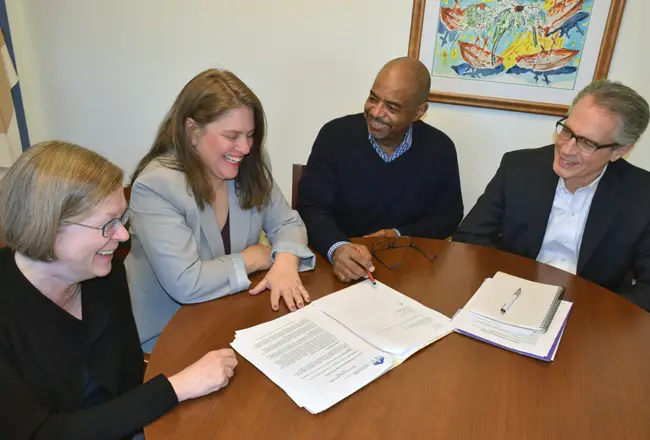
Not everyone going to college wants to be their own boss. But for those who do, Norwalk Community College (NCC) offers a program that enables students to bypass the job hunt and do just that.
Since the Entrepreneurs Institute began in 2014, one project, a Stamford-based children”™s educational company called The Game of Mixed Emotions, has been successfully launched, while other projects are still in the development phase.
On March 28, the college is opening the institute to the wider community, offering anyone the chance to enroll for the spring semester with tuition set at $399. The school is hoping to launch a fall semester while also maintaining its summer program.
“Community colleges can deliver a curriculum in a very responsive way,” said Kristina Testa-Buzzee, associate dean of extended studies and workforce education at NCC. “Entrepreneurship studies at a four-year institution is traditionally tied to a four-year degree. Folks that come to a community college are seeking an opportunity to pursue a new credential or to start over, and they don”™t want to do that in the course of four years, or even two years. A 10- to 12-week program serves the heart of the community and the local economy.”
The institute began in 2014 when the NCC Foundation created a task force to study the viability of encouraging students to start and run businesses. “We did research and found that more entrepreneurs come through community colleges than four-year schools,” said Ann Rogers, the foundation”™s executive director.
In 2015, the institute began as a seven-week, 30-hour summer offering modeled on the Fasttrac program developed by the Kauffman Foundation, a Kansas City-based nonprofit that supports entrepreneurial education. The program was initially limited to NCC students, with scholarships provided by the NCC Foundation.
During the program, students receive lessons on the various aspects of starting and running a business, including financial goal planning, market research and analysis, monitoring cash flow and finalizing a successful business plan. At the end of the program, students present a “Shark Tank”-style pitch on the businesses they hope to create.
Stephen Mersereau, an adjunct professor and instructor for the institute, noted that class sizes are limited to 15 students.
“This is a very intense process, with a lot of one-on-one advisory,” he said, adding that local business owners help with the lessons. “Experienced entrepreneurs give students more practical insight. By the time you graduate, you are in a position to launch a business ”” a practical, fundable, presentable business.”
Vincent Murphy, chairman of the NCC Foundation”™s Entrepreneurship Task Force, said the program encourages students to tap into the knowledge of as many people who can guide them to self-employment.
“A lot of students ask questions, but there are a lot of questions they don”™t know to ask,” he said. “One of those questions involves the degree to which longer-term mentorship can help them sustain. One of the things we are trying to develop is a mentorship program whereas once someone is in our business launch pipeline, they can have folks on the faculty or the foundation to communicate with and help them along.”
One topic that Mersereau has repeatedly been asked about by his students is funding for a startup. “Cash is king,” he said. “As we go through the process, we learn a lot more of how to get it, control it and make it.”
He said that students also learn about the ability to be nimble and recognize that some companies need to reinvent themselves as they go along.
“The most successful companies have been through several pivots before they found that spot where the market is willing to pay a lot or willing to join to accept the product or innovation,” he said, citing Airbnb and Facebook as being able to redirect their operations during their early years.
However, not every startup becomes Airbnb and Facebook, and recognizing the high mortality rate among startups is a crucial aspect of the program.
“They fail quickly and in significant numbers,” Mersereau said. “Within a year, maybe 20 percent. Within five years, 50 percent are gone. We try to help people to build and run a sustainable business. Most of these failures can be attributed to a couple of key issues, usually bad decisions involving cash management ”” people either overextend themselves or make the wrong kind of investment decisions and, ultimately, they are stressed and fail. Preventing those failures tend to sustain more jobs.”






















